北师版(2019) 选择性必修二 Unit 5Education Lesson 2 The Objectives of Education课件(共29张PPT)
文档属性
| 名称 | 北师版(2019) 选择性必修二 Unit 5Education Lesson 2 The Objectives of Education课件(共29张PPT) | 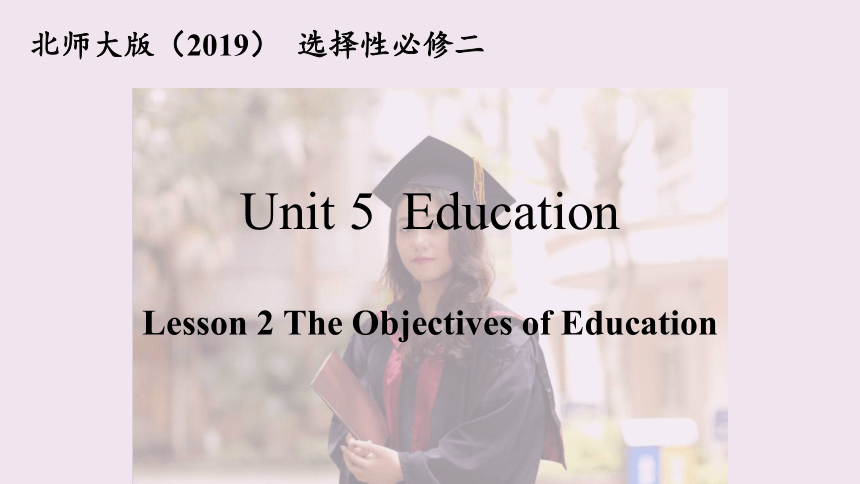 | |
| 格式 | pptx | ||
| 文件大小 | 20.1MB | ||
| 资源类型 | 教案 | ||
| 版本资源 | 北师大版(2019) | ||
| 科目 | 英语 | ||
| 更新时间 | 2023-08-20 14:51:39 | ||
图片预览

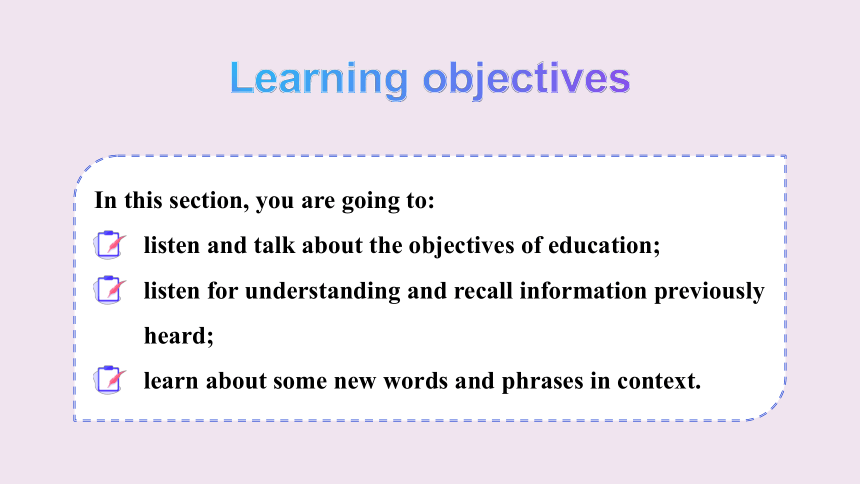
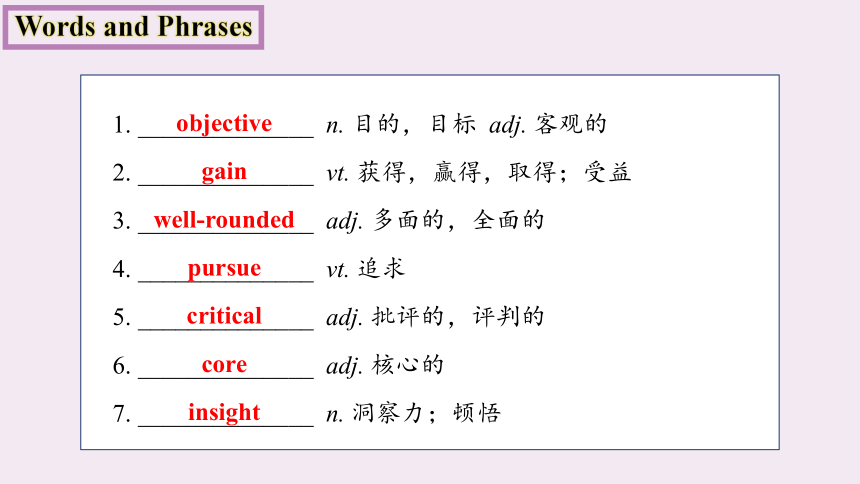
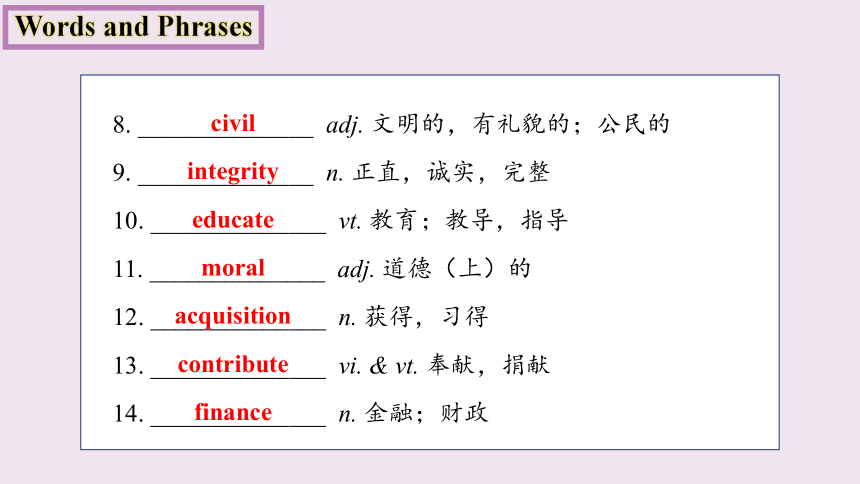
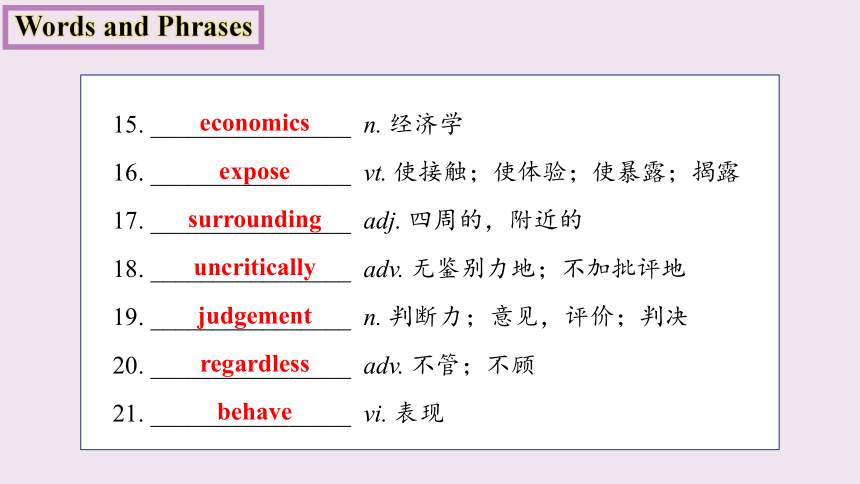
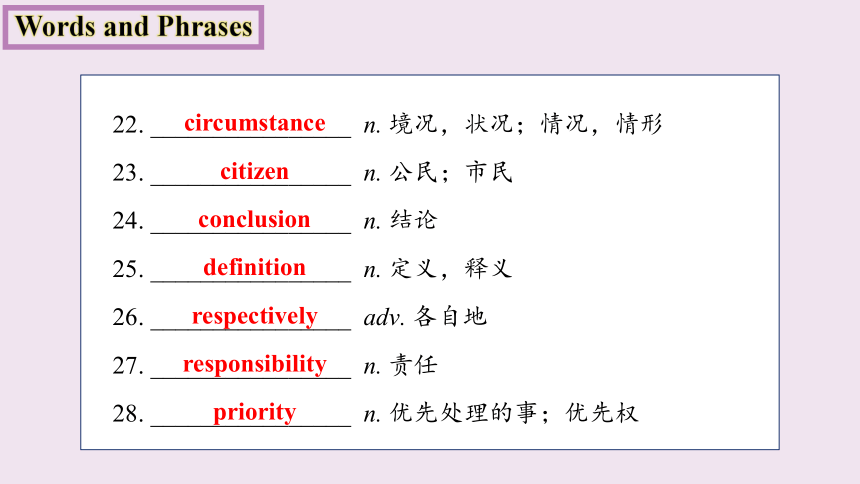
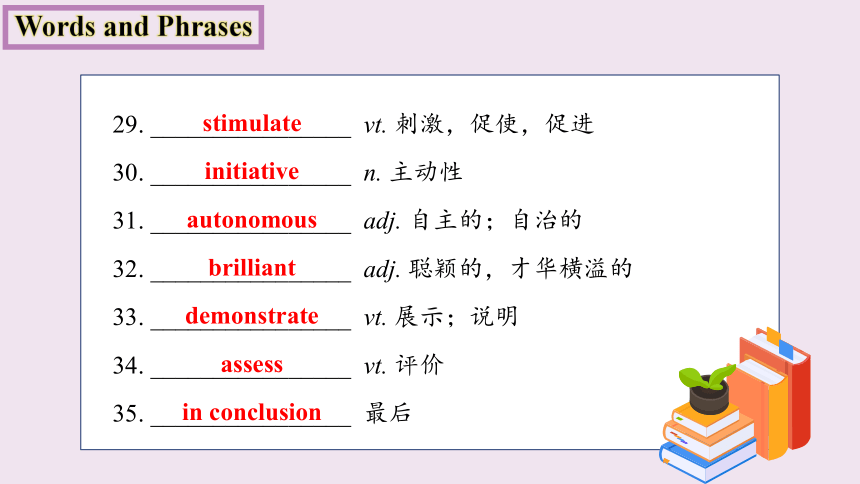
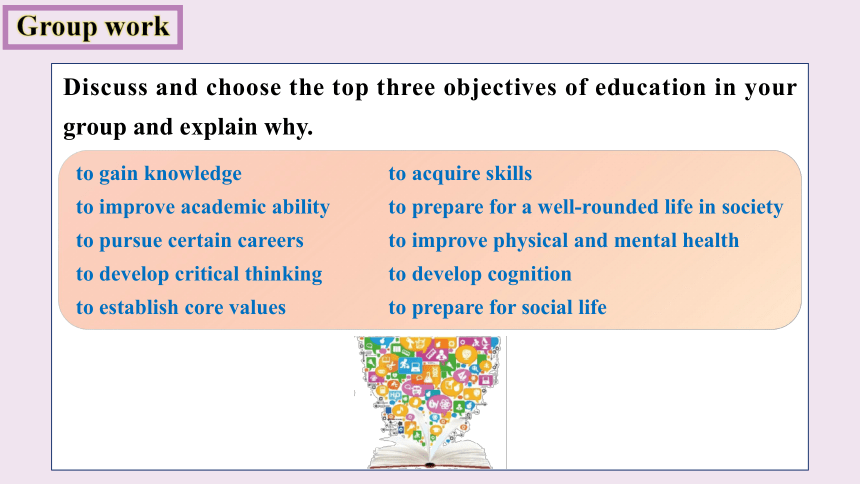
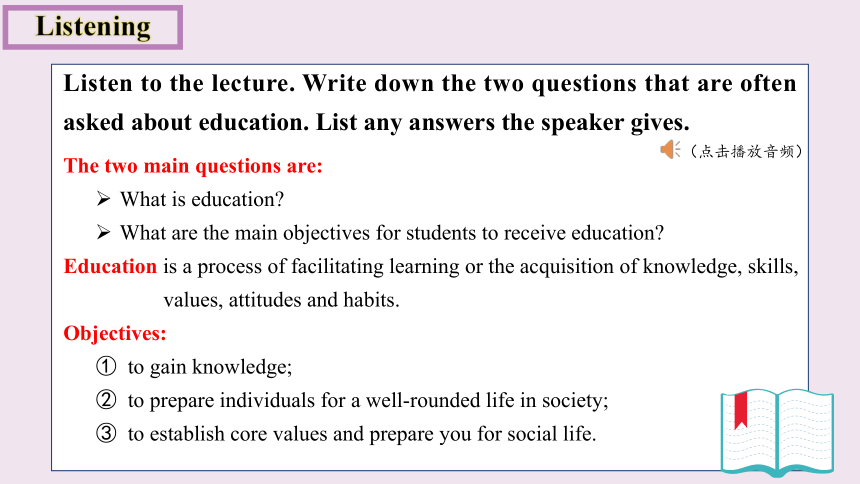
文档简介
(共29张PPT)
Unit 5 Education
Lesson 2 The Objectives of Education
北师大版(2019) 选择性必修二
In this section, you are going to:
listen and talk about the objectives of education;
listen for understanding and recall information previously heard;
learn about some new words and phrases in context.
Learning objectives
1. ______________ n. 目的,目标 adj. 客观的
2. ______________ vt. 获得,赢得,取得;受益
3. ______________ adj. 多面的,全面的
4. ______________ vt. 追求
5. ______________ adj. 批评的,评判的
6. ______________ adj. 核心的
7. ______________ n. 洞察力;顿悟
objective
gain
well-rounded
pursue
critical
core
insight
Words and Phrases
8. ______________ adj. 文明的,有礼貌的;公民的
9. ______________ n. 正直,诚实,完整
10. ______________ vt. 教育;教导,指导
11. ______________ adj. 道德(上)的
12. ______________ n. 获得,习得
13. ______________ vi. & vt. 奉献,捐献
14. ______________ n. 金融;财政
civil
integrity
educate
moral
acquisition
contribute
finance
Words and Phrases
15. ________________ n. 经济学
16. ________________ vt. 使接触;使体验;使暴露;揭露
17. ________________ adj. 四周的,附近的
18. ________________ adv. 无鉴别力地;不加批评地
19. ________________ n. 判断力;意见,评价;判决
20. ________________ adv. 不管;不顾
21. ________________ vi. 表现
economics
expose
surrounding
uncritically
judgement
regardless
behave
Words and Phrases
22. ________________ n. 境况,状况;情况,情形
23. ________________ n. 公民;市民
24. ________________ n. 结论
25. ________________ n. 定义,释义
26. ________________ adv. 各自地
27. ________________ n. 责任
28. ________________ n. 优先处理的事;优先权
circumstance
citizen
conclusion
definition
respectively
responsibility
priority
Words and Phrases
29. ________________ vt. 刺激,促使,促进
30. ________________ n. 主动性
31. ________________ adj. 自主的;自治的
32. ________________ adj. 聪颖的,才华横溢的
33. ________________ vt. 展示;说明
34. ________________ vt. 评价
35. ________________ 最后
stimulate
initiative
autonomous
brilliant
demonstrate
assess
in conclusion
Words and Phrases
Group work
Discuss and choose the top three objectives of education in your group and explain why.
to gain knowledge
to improve academic ability
to pursue certain careers
to develop critical thinking
to establish core values
to acquire skills
to prepare for a well-rounded life in society
to improve physical and mental health
to develop cognition
to prepare for social life
Listening
Listen to the lecture. Write down the two questions that are often asked about education. List any answers the speaker gives.
The two main questions are:
What is education
What are the main objectives for students to receive education
Education is a process of facilitating learning or the acquisition of knowledge, skills, values, attitudes and habits.
Objectives:
to gain knowledge;
to prepare individuals for a well-rounded life in society;
to establish core values and prepare you for social life.
(点击播放音频)
Listen to Part 1 of the lecture. Where does the word “education” come from What does it mean
Listening
Education comes from the Latin for “to lead”. It means when you are educated you are led from one place to another, including physical, moral, mental or academic.
(点击播放音频)
Listening
Tapescript
Good afternoon, everyone. In today’s lecture, we’ll be discussing education. The questions we often ask about education are: what is education And what are the main objectives for students to receive education
Well, what is education Education comes from the Latin for “to lead”. So, when you are educated you are led from one place to another, including physical, moral, mental or academic. It is a process of facilitating learning or the acquisition of knowledge, skills, values, attitudes and habits.
Listen to Part 2 of the plete the table below. Then talk about the three main objectives of education and supporting ideas with your partner.
Listening
Three Main Objectives of Education
To _____ knowledge provide knowledge necessary not only to _____________________ but also to ____________ the world.
let us understand how _____________________ works.
give us insights into how people think and the attitude we need in order to __________________________________.
gain
pursue certain careers
contribute to
the surrounding world
understand people of different cultures
(点击播放音频)
Three Main Objectives of Education
To prepare individuals for a ____________ life in society provide learners with the tools to develop skills, to think for themselves and to _________________ throughout their lives.
help individuals develop ____________________.
To __________ core values and prepare you for __________ help to understand what is wrong and _____________.
help to explore ___________ and develop ___________.
help to learn how to _______ with other people in a civil manner.
make people _________ with integrity.
enable learners to establish _________________________, as well as form _____________.
well-rounded
continue learning
critical thinking skills
what is right
establish
social life
the truth
cognition
interact
behave
the right values and attitudes
good habits
Listening
Listening
Tapescript
Let’s move on to talk about the objectives of education.
For me, education has three main objectives. Firstly, it is to gain knowledge. Obviously, certain kinds of knowledge are necessary not only to pursue certain careers but also to contribute to the world. For example, we need to learn maths to understand finance and economics; we need to be able to read, so that we are able to communicate and expose ourselves to new things. Besides, education provides another deeper kind of knowledge, which lets us understand how the surrounding world works. It gives us insights into how people think and the attitude we need in order to understand people of different cultures.
Secondly, education goes beyond knowledge; it prepares individuals for a well-rounded life in society. In other words, it provides learners with the tools to develop skills, to think for themselves and to continue learning throughout their lives. For example, education can help individuals develop critical thinking skills, which will prevent them from following uncritically traditional ways and will enable them to act based on judgement.
Listening
Thirdly, education establishes core values and prepares you for social life. It helps you to understand what is wrong and what is right, explore the truth and develop cognition, regardless of whether it’s easy or what others’ opinions are; it also helps you learn how to interact with other people in a civil manner, regardless of nationality, race or class. It makes people behave with integrity, regardless of background and circumstances. Therefore, there will be more critical, kind, honest and truthful citizens in society. Eventually, education also enables learners to establish the right values and attitudes, as well as form good habits so that they can become responsible citizens as well.
In conclusion, education is important not only because it facilitates individual development, but also promotes social and national development. Referring back to the definition provided at the very beginning, education facilitates the development of an individual physically, mentally, morally and academically, so that the individual can make effective contributions to social development.
Any questions
cognition
core values
education
oneself to new things
insights into
knowledge
gain
expose
develop
establish
receive
give
Match the expressions to make collocations. Then use the collocations to complete the sentences.
Exercise
gain knowledge expose oneself to new things
develop cognition establish core values
receive education give insights into
1. Everyone has the right to ________________.
2. Don’t be afraid of ____________________________. We should always learn new knowledge.
3. The article ________________ the purpose of education.
4. We _______________ from reading to improve ourselves.
5. Senior Secondary is a critical period to ________________ and __________ _____________.
receive education
exposing ourselves to new things
gives insights into
gain knowledge
develop cognition
establish
Exercise
core values
Listen to the Q & A session of the lecture. What question does the student ask What are Professor James’ responses to the question
The student’s question: ______________________________________
________________________________________________________
Listening
In order to achieve the main objectives of education, what should teachers and students do respectively
(点击播放音频)
Teachers should:
facilitate _________________;
pass on ______________ and ________________;
stimulate students’ ____________________;
teach students to think ___________ and ____________;
provide rich __________________ and help students learn to use _____________________________________________.
students’ learning
knowledge
interests in learning
skills to students
critically
creatively
resources
the right strategies to make learning more effective
Listening
Students should:
become _____________ learners;
have ______________________ for themselves;
learn how to __________, __________ and ______________________;
make ____________________ to guide one’s own beliefs and actions;
_____________ what they have learnt.
autonomous
clear learning goals
analyse
evaluate what is taught
proper judgements
demonstrate
compare
Listening
Listening
Tapescript
(S=A student J=Professor James)
S: Professor James, thank you very much for the very insightful talk. It makes me rethink the objectives of education. My question is: in order to achieve the main objectives of education, what should teachers and students do respectively
J: That is a very good question. Let’s first talk about teachers’ responsibility. I think a teacher’s top priority is to facilitate students’ learning. That means a teacher’s job is not just to pass on knowledge and skills to students, but it’s more important to stimulate students’ interests in learning and teach them to think critically and creatively. Also, a teacher needs to support students’ learning by providing rich resources and helping them learn to use the right strategies to make learning more effective.
Listening
S: Thank you. What about the students’ responsibility
J: Well, I believe it is the students’ responsibility to take the initiative to become autonomous learners. That’s why students need to have clear learning goals for themselves and to learn how to analyse, compare and evaluate what is taught. Another thing that’s important for students is that they need to make proper judgements to guide their own beliefs and actions, and it’s a brilliant idea to demonstrate what they have learnt when assessed.
S: Thank you.
Listen and plete the Talk Builder.
Another thing that’s important That’s why
It’s a brilliant idea to It’s more important to
Talk Builder
Convincing
1. ____________________ stimulate students’ interests in learning.
2. _________________ students need to have clear learning goals for themselves.
3. _____________________________ for students is that they need to make proper judgements …
4. ___________________ demonstrate what they have learnt.
It’s more important to
That’s why
Another thing that’s important
It’s a brilliant idea to
Listening
(点击播放音频)
Discuss the objectives of education in groups using convincing expressions.
Speaking
Language points
1. Obviously, certain kinds of knowledge are necessary not only to pursue certain careers but also to contribute to the world.
显然,某些知识不仅对追求某些职业是必要的,而且对世界也有贡献。
contribute vi. & vt. 奉献;捐献
【例句】
① He did not contribute anything to his family.
他对他的家庭并无任何贡献。
② They say they would like to contribute more to charity, but money is tight this year.
他们说他们很想捐献更多的钱支持慈善事业,但是今年的钱非常紧张。
【词汇拓展】
contributor n. 贡献者;捐款者;捐赠者
contribution n. 捐款,捐资;贡献,促成作用
2. It gives us insights into how people think and the attitude we need in order to understand people of different cultures.
它使我们深入了解人们是如何思考的,以及为了理解不同文化背景的人我们需要采取什么态度。
insights n. 洞察力;顿悟
【常见搭配】
give insight into 使顿悟,猛醒
a writer of great insight 有深刻洞察力的作家
【例句】
① He was a man with considerable insight. 他是个富有洞察力的人。
② With a flash of insight I realized what the dream meant.
我突然明白了这个梦意味着什么。
Language points
③ These texts give the reader an insight into the Chinese mind.
这些文章使读者对中国人的思维有了深层次的认识。
④ This book gives us some insight into the history of the Second World War.
这本书使我们深入了解第二次世界大战的历史。
【词汇拓展】
eyesight n. 视力 farsighted adj. 有远见的
foresight n. 远见 hindsight n. 事后聪明
longsighted adj. 远视的 nearsighted adj. 近视的
oversight n. 疏漏 shortsighted adj. 目光短浅的;近视的
sightseeing n. 观光;游览
Language points
3. It helps you to understand what is wrong and what is right, explore the truth and develop cognition, regardless of whether it’s easy or what others’ opinions are.
它帮助人们判断止误,探讨真理,培养认知能力,不管其是否容易、不管其他人的看法。
regardless of 不管;不顾
【例句】
① They were determined to carry on the experiment regardless of difficulties.
他们决心继续实验,不管困难如何。
② It takes in anybody regardless of religion, colour, or creed.
任何人,不论宗教、肤色或信仰,都可以加入。
③ Everyone has the right to good medical care regardless of their ability to pay.
无论支付能力如何,每个人都有权得到良好的医疗。
Language points
Thank you
Unit 5 Education
Lesson 2 The Objectives of Education
北师大版(2019) 选择性必修二
In this section, you are going to:
listen and talk about the objectives of education;
listen for understanding and recall information previously heard;
learn about some new words and phrases in context.
Learning objectives
1. ______________ n. 目的,目标 adj. 客观的
2. ______________ vt. 获得,赢得,取得;受益
3. ______________ adj. 多面的,全面的
4. ______________ vt. 追求
5. ______________ adj. 批评的,评判的
6. ______________ adj. 核心的
7. ______________ n. 洞察力;顿悟
objective
gain
well-rounded
pursue
critical
core
insight
Words and Phrases
8. ______________ adj. 文明的,有礼貌的;公民的
9. ______________ n. 正直,诚实,完整
10. ______________ vt. 教育;教导,指导
11. ______________ adj. 道德(上)的
12. ______________ n. 获得,习得
13. ______________ vi. & vt. 奉献,捐献
14. ______________ n. 金融;财政
civil
integrity
educate
moral
acquisition
contribute
finance
Words and Phrases
15. ________________ n. 经济学
16. ________________ vt. 使接触;使体验;使暴露;揭露
17. ________________ adj. 四周的,附近的
18. ________________ adv. 无鉴别力地;不加批评地
19. ________________ n. 判断力;意见,评价;判决
20. ________________ adv. 不管;不顾
21. ________________ vi. 表现
economics
expose
surrounding
uncritically
judgement
regardless
behave
Words and Phrases
22. ________________ n. 境况,状况;情况,情形
23. ________________ n. 公民;市民
24. ________________ n. 结论
25. ________________ n. 定义,释义
26. ________________ adv. 各自地
27. ________________ n. 责任
28. ________________ n. 优先处理的事;优先权
circumstance
citizen
conclusion
definition
respectively
responsibility
priority
Words and Phrases
29. ________________ vt. 刺激,促使,促进
30. ________________ n. 主动性
31. ________________ adj. 自主的;自治的
32. ________________ adj. 聪颖的,才华横溢的
33. ________________ vt. 展示;说明
34. ________________ vt. 评价
35. ________________ 最后
stimulate
initiative
autonomous
brilliant
demonstrate
assess
in conclusion
Words and Phrases
Group work
Discuss and choose the top three objectives of education in your group and explain why.
to gain knowledge
to improve academic ability
to pursue certain careers
to develop critical thinking
to establish core values
to acquire skills
to prepare for a well-rounded life in society
to improve physical and mental health
to develop cognition
to prepare for social life
Listening
Listen to the lecture. Write down the two questions that are often asked about education. List any answers the speaker gives.
The two main questions are:
What is education
What are the main objectives for students to receive education
Education is a process of facilitating learning or the acquisition of knowledge, skills, values, attitudes and habits.
Objectives:
to gain knowledge;
to prepare individuals for a well-rounded life in society;
to establish core values and prepare you for social life.
(点击播放音频)
Listen to Part 1 of the lecture. Where does the word “education” come from What does it mean
Listening
Education comes from the Latin for “to lead”. It means when you are educated you are led from one place to another, including physical, moral, mental or academic.
(点击播放音频)
Listening
Tapescript
Good afternoon, everyone. In today’s lecture, we’ll be discussing education. The questions we often ask about education are: what is education And what are the main objectives for students to receive education
Well, what is education Education comes from the Latin for “to lead”. So, when you are educated you are led from one place to another, including physical, moral, mental or academic. It is a process of facilitating learning or the acquisition of knowledge, skills, values, attitudes and habits.
Listen to Part 2 of the plete the table below. Then talk about the three main objectives of education and supporting ideas with your partner.
Listening
Three Main Objectives of Education
To _____ knowledge provide knowledge necessary not only to _____________________ but also to ____________ the world.
let us understand how _____________________ works.
give us insights into how people think and the attitude we need in order to __________________________________.
gain
pursue certain careers
contribute to
the surrounding world
understand people of different cultures
(点击播放音频)
Three Main Objectives of Education
To prepare individuals for a ____________ life in society provide learners with the tools to develop skills, to think for themselves and to _________________ throughout their lives.
help individuals develop ____________________.
To __________ core values and prepare you for __________ help to understand what is wrong and _____________.
help to explore ___________ and develop ___________.
help to learn how to _______ with other people in a civil manner.
make people _________ with integrity.
enable learners to establish _________________________, as well as form _____________.
well-rounded
continue learning
critical thinking skills
what is right
establish
social life
the truth
cognition
interact
behave
the right values and attitudes
good habits
Listening
Listening
Tapescript
Let’s move on to talk about the objectives of education.
For me, education has three main objectives. Firstly, it is to gain knowledge. Obviously, certain kinds of knowledge are necessary not only to pursue certain careers but also to contribute to the world. For example, we need to learn maths to understand finance and economics; we need to be able to read, so that we are able to communicate and expose ourselves to new things. Besides, education provides another deeper kind of knowledge, which lets us understand how the surrounding world works. It gives us insights into how people think and the attitude we need in order to understand people of different cultures.
Secondly, education goes beyond knowledge; it prepares individuals for a well-rounded life in society. In other words, it provides learners with the tools to develop skills, to think for themselves and to continue learning throughout their lives. For example, education can help individuals develop critical thinking skills, which will prevent them from following uncritically traditional ways and will enable them to act based on judgement.
Listening
Thirdly, education establishes core values and prepares you for social life. It helps you to understand what is wrong and what is right, explore the truth and develop cognition, regardless of whether it’s easy or what others’ opinions are; it also helps you learn how to interact with other people in a civil manner, regardless of nationality, race or class. It makes people behave with integrity, regardless of background and circumstances. Therefore, there will be more critical, kind, honest and truthful citizens in society. Eventually, education also enables learners to establish the right values and attitudes, as well as form good habits so that they can become responsible citizens as well.
In conclusion, education is important not only because it facilitates individual development, but also promotes social and national development. Referring back to the definition provided at the very beginning, education facilitates the development of an individual physically, mentally, morally and academically, so that the individual can make effective contributions to social development.
Any questions
cognition
core values
education
oneself to new things
insights into
knowledge
gain
expose
develop
establish
receive
give
Match the expressions to make collocations. Then use the collocations to complete the sentences.
Exercise
gain knowledge expose oneself to new things
develop cognition establish core values
receive education give insights into
1. Everyone has the right to ________________.
2. Don’t be afraid of ____________________________. We should always learn new knowledge.
3. The article ________________ the purpose of education.
4. We _______________ from reading to improve ourselves.
5. Senior Secondary is a critical period to ________________ and __________ _____________.
receive education
exposing ourselves to new things
gives insights into
gain knowledge
develop cognition
establish
Exercise
core values
Listen to the Q & A session of the lecture. What question does the student ask What are Professor James’ responses to the question
The student’s question: ______________________________________
________________________________________________________
Listening
In order to achieve the main objectives of education, what should teachers and students do respectively
(点击播放音频)
Teachers should:
facilitate _________________;
pass on ______________ and ________________;
stimulate students’ ____________________;
teach students to think ___________ and ____________;
provide rich __________________ and help students learn to use _____________________________________________.
students’ learning
knowledge
interests in learning
skills to students
critically
creatively
resources
the right strategies to make learning more effective
Listening
Students should:
become _____________ learners;
have ______________________ for themselves;
learn how to __________, __________ and ______________________;
make ____________________ to guide one’s own beliefs and actions;
_____________ what they have learnt.
autonomous
clear learning goals
analyse
evaluate what is taught
proper judgements
demonstrate
compare
Listening
Listening
Tapescript
(S=A student J=Professor James)
S: Professor James, thank you very much for the very insightful talk. It makes me rethink the objectives of education. My question is: in order to achieve the main objectives of education, what should teachers and students do respectively
J: That is a very good question. Let’s first talk about teachers’ responsibility. I think a teacher’s top priority is to facilitate students’ learning. That means a teacher’s job is not just to pass on knowledge and skills to students, but it’s more important to stimulate students’ interests in learning and teach them to think critically and creatively. Also, a teacher needs to support students’ learning by providing rich resources and helping them learn to use the right strategies to make learning more effective.
Listening
S: Thank you. What about the students’ responsibility
J: Well, I believe it is the students’ responsibility to take the initiative to become autonomous learners. That’s why students need to have clear learning goals for themselves and to learn how to analyse, compare and evaluate what is taught. Another thing that’s important for students is that they need to make proper judgements to guide their own beliefs and actions, and it’s a brilliant idea to demonstrate what they have learnt when assessed.
S: Thank you.
Listen and plete the Talk Builder.
Another thing that’s important That’s why
It’s a brilliant idea to It’s more important to
Talk Builder
Convincing
1. ____________________ stimulate students’ interests in learning.
2. _________________ students need to have clear learning goals for themselves.
3. _____________________________ for students is that they need to make proper judgements …
4. ___________________ demonstrate what they have learnt.
It’s more important to
That’s why
Another thing that’s important
It’s a brilliant idea to
Listening
(点击播放音频)
Discuss the objectives of education in groups using convincing expressions.
Speaking
Language points
1. Obviously, certain kinds of knowledge are necessary not only to pursue certain careers but also to contribute to the world.
显然,某些知识不仅对追求某些职业是必要的,而且对世界也有贡献。
contribute vi. & vt. 奉献;捐献
【例句】
① He did not contribute anything to his family.
他对他的家庭并无任何贡献。
② They say they would like to contribute more to charity, but money is tight this year.
他们说他们很想捐献更多的钱支持慈善事业,但是今年的钱非常紧张。
【词汇拓展】
contributor n. 贡献者;捐款者;捐赠者
contribution n. 捐款,捐资;贡献,促成作用
2. It gives us insights into how people think and the attitude we need in order to understand people of different cultures.
它使我们深入了解人们是如何思考的,以及为了理解不同文化背景的人我们需要采取什么态度。
insights n. 洞察力;顿悟
【常见搭配】
give insight into 使顿悟,猛醒
a writer of great insight 有深刻洞察力的作家
【例句】
① He was a man with considerable insight. 他是个富有洞察力的人。
② With a flash of insight I realized what the dream meant.
我突然明白了这个梦意味着什么。
Language points
③ These texts give the reader an insight into the Chinese mind.
这些文章使读者对中国人的思维有了深层次的认识。
④ This book gives us some insight into the history of the Second World War.
这本书使我们深入了解第二次世界大战的历史。
【词汇拓展】
eyesight n. 视力 farsighted adj. 有远见的
foresight n. 远见 hindsight n. 事后聪明
longsighted adj. 远视的 nearsighted adj. 近视的
oversight n. 疏漏 shortsighted adj. 目光短浅的;近视的
sightseeing n. 观光;游览
Language points
3. It helps you to understand what is wrong and what is right, explore the truth and develop cognition, regardless of whether it’s easy or what others’ opinions are.
它帮助人们判断止误,探讨真理,培养认知能力,不管其是否容易、不管其他人的看法。
regardless of 不管;不顾
【例句】
① They were determined to carry on the experiment regardless of difficulties.
他们决心继续实验,不管困难如何。
② It takes in anybody regardless of religion, colour, or creed.
任何人,不论宗教、肤色或信仰,都可以加入。
③ Everyone has the right to good medical care regardless of their ability to pay.
无论支付能力如何,每个人都有权得到良好的医疗。
Language points
Thank you
同课章节目录
- Unit 4 Humour
- Lesson 1 What’s So Funny?
- Lesson 2 Why Do We Need Humour?
- Lesson 3 My Favourite Comedian
- Unit 5 Education
- Lesson 1 Enlightening a Mind
- Lesson 2 The Objectives of Education
- Lesson 3 Understanding
- Unit 6 The Media
- Lesson 1 From Page to Screen
- Lesson 2 Questions about Media
- Lesson 3 The Advertising Game
